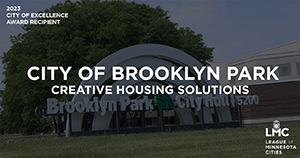Door Knocking Campaign Provides Voice for Brooklyn Park Renters
By Andrew Tellijohn
Brooklyn Park city staff has long had regular meetings with apartment property managers in its city. But after a series of reports indicated high eviction rates, significant shortcomings in unaddressed maintenance needs, and a lack of relationship between the city and its apartment-dwelling residents, city officials took action.
 The city overhauled its previously routine annual oversight program and initiated a door knocking campaign aimed at building rapport with residents who live in rental properties. After visiting with hundreds of tenants across five apartment complexes, elected officials are rewriting laws and city staff are proactively enforcing improvements to better apartment residents’ standard of living.
The city overhauled its previously routine annual oversight program and initiated a door knocking campaign aimed at building rapport with residents who live in rental properties. After visiting with hundreds of tenants across five apartment complexes, elected officials are rewriting laws and city staff are proactively enforcing improvements to better apartment residents’ standard of living.
“This work started with knowing we have a high eviction rate as well as renters expressing concerns with property maintenance,” said Kimberly Berggren, director of community development. “We decided to get out and connect directly with renters where they live to help us figure out how the city can use its tools and resources to help improve living conditions.”
Back to the beginning
The program, which won the League’s 2023 City of Excellence Award for “Creative Solutions for City Housing Challenges,” kicked off in 2019 when the Brooklyn Park Economic Development Authority first commissioned and funded a study of renters’ experiences in the city’s largest apartment communities.
Conducted by the University of Minnesota’s Center for Urban and Regional Affairs (CURA), the report followed an earlier study indicating Brooklyn Park has some of the highest rental property eviction rates in the state. Researchers interviewed apartment residents who expressed concerns around affordability, safety, and dignity in housing.
CURA’s January 2022 report recommended that the city play a more proactive role in collaborating with community members to establish and enforce expectations for property management actions in rental housing units.
“It made the city realize how we need to have a direct relationship with tenants and not just through property managers,” said Josie Shardlow, Brooklyn Park’s community engagement manager. “This is a complete shift in how the city works with renters.”
City staff, elected officials, community leaders, and others decided to pilot a renter-centered proactive door knocking program to hear from apartment residents directly on maintenance, communication, and livability concerns they were facing and to inform them of different city programs and resources available that might help improve their circumstances, such as Health on the Go events and training on Driver’s License for All legislation.
Knocking on doors
Staff chose to prioritize visiting neighborhoods with higher concentrations of diversity and affordable housing. The proactive program partnered the city’s rental inspectors and community engagement staff, who set off in teams to meet the residents.
Staff identified priority complexes where violations and repeat maintenance issues had been previously observed, complaints or requests for service had increased, and where active managerial control was lacking and maintenance was deemed not responsive to apartment residents’ needs.
This differed from past efforts, which had centered on a single floor in each building, common areas and exterior maintenance.
Staff goals included:
- Connecting with residents to provide resources.
- Documenting problems.
- Educating residents on how to connect with the city, property management, and maintenance staff.
- Making sure property management firms address identified maintenance items.
“The city’s historic practices have been more focused on the relationship between the city and the rental property manager, Berggren said. “This really adds more of a human-centered thoughtful approach to how we think about the housing in the community and making sure that we’re elevating the needs of renters.”
Property managers notified renters about the door knockings, but were not included on visits.
Many residents welcomed the visits, staff said. Others were skeptical. When residents were either not around or did not open their doors, city officials left informational materials.
The door knockers ended up, over the course of a few months, speaking with hundreds of apartment residents. “A surprising number of people answered the door,” Shardlow said.
She went on a few of the door knocking sessions, which were held in the mid-to-late afternoon and helped coordinate others.
“We just talked with whoever answered the door. We introduced ourselves, said that we were with the city, and we’re just checking in and seeing how everything’s going,” she said. Initial reactions varied. Some people were hesitant to raise any issues. Others invited them into their apartments and eagerly pointed out issues.
“It was kind of a wide spectrum,” she said. “What’s helpful is, as we talk to people on a certain floor or in a certain building, if some people are more willing to share, then we can ask about things we’ve already heard. We can say, ‘Oh, some of your neighbors talked about this issue. Have you seen that?’ Sometimes that will open up the conversation.”
No intent for confrontation
There might be a couple of rental property managers in the city who feel like the door knocking program is an overreach of government authority, but city code allows the enforcement of rules and regulations within reason, said Keith Jullie, manager of the city’s rental and business licensing division.
City officials believe apartment residents felt safer after the meetings in communicating concerns to management without fear of retaliation. The intent is not for this to be a contentious program, though Brooklyn Park officials do intend to follow through on making sure residents have better living conditions.
“We want to have the managers’ cooperation and support,” he said. “It works a lot better that way. However, if in the future we run across someone who doesn’t like it, and we feel a need to door knock, we have the legal authority to do that and we will.”
At one apartment complex, Huntington Place, staff visited with people in 236 units. Residents expressed concerns about mold, pests, leaky pipes, holes in walls and ceilings, doors in disrepair, unsanitary units, lack of life safety items such as carbon monoxide alarms, and security concerns.
City staff issued correction orders on all identified property maintenance code violations and ensured corrections were completed. They continue meeting with Huntington Place residents on a frequent basis, have improved ongoing inspections, and are being proactive in following up on fixes, according to a summary report.
While there may have been some initial hesitation, Huntington Place management also was “trying to work with us so they could show that they are doing the best they can to move forward,” Jullie said.
After finishing at Huntington Place, city officials had that property management’s endorsement.
“They were aware of the program,” Jullie said. “They agreed with what we were trying to accomplish there. They sent notification to their residents, letting them know we were coming and why we were coming.”
What’s next?
After visiting five apartment complexes city staff are happy with initial results. Residents now know it is OK to report maintenance concerns without fear of losing their residence.
“With regards to educating and building some trust and ensuring some better communication in the five apartment complexes that we’ve been at, we’ve been very successful,” said Jason Newby, inspections and environmental health manager.
Previously there had been fear of retaliation and a simple lack of knowledge, he added. The materials distributed by city officials included detailed information in several languages on how to properly report issues or reach city officials.
“There are people who just don’t know how to report maintenance issues,” he said. “Those types of things are definitely improved now because of this program.”
City staff is now working to collect from property managers policies and procedures surrounding their communication with residents relating to emergencies, power outages, towing, maintenance, and other issues. Many companies are doing fine, but visits revealed that others are using outdated communication modes, such as leaving Post-it notes on doors.
Meanwhile, Newby said, the city has also been working on updating its rental ordinances. The City Council recently passed a new rental inspection program requiring property managers to allow city staff to door knock, though these visits preceded the change. The change likely will provide better and easier enforcement of rental standards.
Moving forward
Staff has decided to continue the program with planning underway on visiting the rest of the city’s apartments. Then they’ll start over and do it again.
“I think, big picture, it’s showing a level of commitment to our apartment residents,” Newby said. “It helps identify problems, it helps identify potential solutions, and just makes the properties better places to live.”
It can be time consuming with limited staff resources to find time to make the visits, but thus far the benefits have outweighed the challenges.
“It really doesn’t take that long and when you do have conversations it’s so impactful,” Shardlow said. “People are surprised the city is at the door and they’re like ‘Whoa, the city really cares.’ It’s worth the effort.”
Andrew Tellijohn is a freelance writer.


